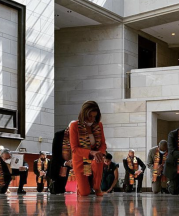Performative activism does more harm than good.
Case in point: In 2020, for maybe all of five minutes, Black lives mattered. Demanding justice for George Floyd was all the rage as self-proclaimed allies poured into the streets chanting “Black Lives Mat-ter!” sporting their new "I-can't-breathe" face masks and hand-painted protest signs demanding that we #SayHerName.
Across the ceramics field, we witnessed an unprecedented outcry for organizations to reckon with their complicity, which resulted in countless cringe-worthy statements of solidarity flooding our social media feeds week after week. Almost overnight, arts administrators, educators, collectors, and curators were all at once vying for the attention of Black ceramic artists and, from an outsider's point of view, it may have appeared that change was on the horizon. However, those of us on the receiving end of this frantic energy knew differently. Cultivating authentic change is a marathon, not a sprint.
Having emerged from this period with somewhat of a reputation for calling organizations out on Instagram, I playfully refer to this progression of events as my villain origin story. Initially, I had simply rolled my eyes and shrugged it off, but it soon became unbearable to watch ceramic organizations with a longstanding history of excluding Black artists suddenly profess their unflinching solidarity with Black lives (and get applauded for it too!). If their actions in real life did not match what they were preaching on social media, I (and many others) decided to call them out, not so much as a shame tactic but more of a visceral defense to what felt like being racially gaslighted in public.
To me, such organizations, which had made zero changes to their internal policies, seemed to be counting on the pendulum swinging back and returning to business as usual. Although this notion was infuriating, not only did it prove to be accurate, it was also quite inevitable. Like the changing of the tides, the 2020 tsunami of opportunities for Black ceramic artists reached its point of inflection, quietly reversed course, and vanished just as quickly as it had appeared.
Such is the game that performative activists play. These (bad) actors make big and flashy gestures, which are temporal in nature and thus ultimately ineffective in producing structural changes. Performative activism is done out of a desire to make oneself look better, rather than a desire to help the cause being promoted. While it is perfectly acceptable to utilize social media to amplify important causes, the problem arises when these efforts do not transcend into the real world. For instance, what meaning does posting a black square on Instagram have if we refuse to challenge our friends/family in real life, engage in constructive conversations about race, and/or confront our own implicit biases?
Moreover, while some people may engage in performative activism just because they feel pressured to say/do something in light of a heavily trending social issue, there are others whose motivations extend far beyond mere virtue signaling and demonstrating how they're on “the right side of history.” On the extreme end, I have witnessed firsthand how convincingly a pseudo network of artists can perform activism online, leveraging clicks and hashtags into powerful social capital, to attract monetary donations and opportunities for their own personal gain. Granted, although the vast majority of people do not covet this level of nefarious intent, what all performative activists have in common is the objective to garner positive attention with superficial statements of solidarity that are not backed up with measurable action steps in real life.
As with the grand fiasco that was “blackout Tuesday” nearly four years ago, performative activism often amounts to nothing more than a short-term attention grab that may briefly spark some publicity for the issue, but ultimately ends up distracting and detracting from the concentrated efforts of organizers within the marginalized groups who are invested in doing the actual work to effect long-term change.
All that being said, how then do we discern between performative activism and genuine allyship? Social media has become a dangerous and confusing space to navigate and, even with a very modest Instagram following, I too struggle with when or if I should deviate from my page's ceramic arts theme to comment on a pressing social issue. This, of course, is a personal decision that every artist and content creator must make for themselves.
Simply stated, my point is that performative activism does not work and should be avoided at all costs. In fact, I'd even go so far as saying that it's actually worse than doing nothing at all. While I have never called someone out for choosing to remain silent online and taking a break to become more informed, I firmly believe it to be our collective responsibility to hold accountable any person or organization that, in contradiction to their actions in real life, would feign advocacy on social media for the purposes of profit or other professional gains.
Real allyship is a verb and, in practice, it must be earned.
LETTERS TO THE EDITOR
Your thoughts, opinions, and experiences are valuable, and we want to hear from you. Submit your "Letters to the Editor" and let your voice resonate with our diverse community.
Whether you have a strong viewpoint on a recent article, a local issue, or a global concern, this is your platform to express yourself. Share your insights, challenge perspectives, or simply share your personal experiences that could inspire and enlighten others.
GUIDELINES:
- Length: Keep it concise. Aim for 100 to 900 words to ensure your message is impactful.
- Clarity: Clearly state your main point or argument. Be specific and avoid jargon to ensure your letter is accessible to all readers.
- Respect: While we encourage passionate opinions, please maintain a respectful tone. Constructive criticism fosters meaningful dialogue.
- Relevance: Ensure your letter is timely and relevant to our readership.
- Support your claims: Supporting your claim ethically demonstrates a commitment to truthfulness and transparency. Misleading or baseless claims can erode trust, while well-supported arguments contribute to a more honest and open exchange of ideas.
HOW TO SUBMIT: Email your "Letter to the Editor" to editor@studiopotter.org with the subject line: "Letter to the Editor Submission - [Your Name]."
Letters need to be received one week before our publication release (all Studio Potter articles are released on the first of the month). Letters will be reviewed by Studio Potter staff. Selected letters will be featured in our upcoming issues, providing you with a platform to engage with the community and influence the discourse.
Thank you for being an essential part of Studio Potter. We look forward to reading your compelling letters!
 Share
Share

